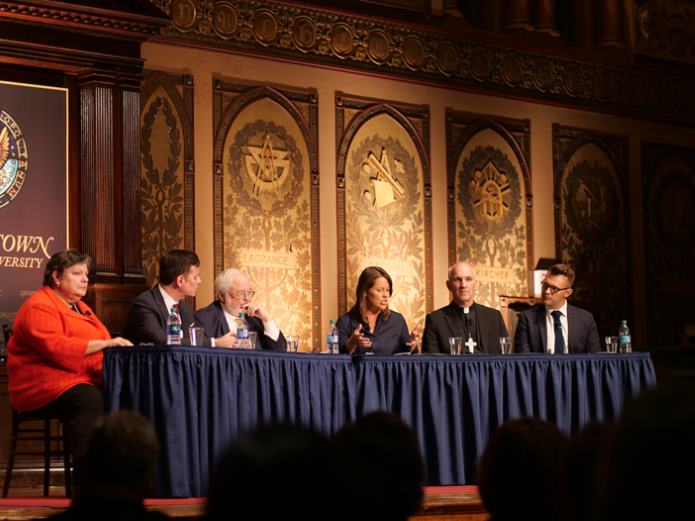|
Panelists Call for Diversity Following Clergy Sexual Abuse Crisis
By Caroline Hecht
Including leaders from diverse backgrounds is critical to reestablishing the Catholic Church’s credibility as it works to address the clergy sexual abuse crisis, panelists said at a Nov. 4 event.The panel included Juan Carlos Cruz, a Chilean survivor of clergy sexual abuse who challenged Pope Francis to take decisive action on the crisis; Bishop Steven Biegler, the bishop of Cheyenne, Wyo., who reopened an investigation into one of his predecessors for child sexual abuse; Christopher White, a journalist who reports on the crisis; and Patricia McGuire, president of Trinity Washington University, who is vocal about the lasting costs of the crisis. The Gaston Hall event, “Where Are We Now? Where Do We Need To Go?”, was moderated by John Carr, director of Georgetown University’s Initiative on Catholic Social Thought and Public Life, and Kim Daniels, associate director of the initiative and an adviser to the Vatican. At the event, Daniels shared the results of the report from the June 2019 “National Convening on Lay Leadership for a Wounded Church and Divided Nation,” which gathered over 50 invited Catholic leaders, survivors, journalists and others. The National Convening was organized by the Initiative on Catholic Social Thought and Public Life and focused on strategizing responses to the clergy sexual abuse crisis. Daniels shared the report’s 10 essential directions for reform and renewal in the wake of the twin crises in the Church: sexual abuse by Catholic clergy and coverups of this abuse by church leaders. The directions’s recommendations include pursuing a survivor-centric response, holding leaders accountable, insisting on transparency and promoting diversity within the Church. “You’ve heard of the Ten Commandments; well, now we have the ten directions,” Carr said. “If you’re looking for the road ahead, this can provide a path.” The panel criticized clericalism, the expectation that Catholics be obedient to the clergy hierarchy that fosters a sense of entitlement and superiority among clergy members, according to Daniels. McGuire described the isolating effect of clericalism and recounted conversations with Catholic primary school principals about the sexual abuse crisis. These principals overseeing schools deeply impacted by the sexual abuse crisis did not receive direct contact from the Church, McGuire said. “Nobody, throughout this whole scandal, nobody in an official capacity in the church ever reached out to them,” McGuire said. “Every letter that came out from the cardinal was addressed to ‘Dear brother priests.’” McGuire spoke about her mother, a devout Catholic, who spent the final years of her life concerned that her children, raised as active Catholics, may have been survivors of abuse. McGuire assured her mother that they were not, but her mother’s fear was emblematic of the way the scandal has harmed the relationship between lay people and clergy. “She was the quintessential woman who was the pillar of the church,” McGuire said. “The betrayal of trust of the faithful in the center is the worst collateral damage of the scandal because that is the support for the church.” A problematic separation exists between Catholic men and women, who were largely educated in single-sex institutions, that makes it difficult to foster understanding among diverse groups in the church. Clericalism leads clergy leaders to focus solely on how to solve the crisis within the church, without being inclusive of Catholic women and others impacted by the crisis, according to McGuire. “This is the problem of clericalism, and it’s the place where the dialogue has completely broken down,” McGuire said. “How can the bishops lead and talk to each other and not talk to the rest of us?” The panelists acknowledged the specific steps forward that the Church has taken in reckoning with the crisis, especially vos estis lux mundi, an addition to church law implemented by Pope Francis in May 2019. Vos estis created new procedural rules to prevent and respond to sexual abuse, including protecting whistleblowers, expanding assistance to the families of survivors and increasing the role of non-clergy members in investigations, according to Catholic News Agency. While vos estis provides a framework for keeping clergy members accountable, making the formal changes a reality is still a serious challenge, according to White. “The challenge, of course, comes with implementation,” White said. While the United States is making progress on accountability, the Catholic Church is a global institution, and there could be a disparity in the implementation of vos estis, Cruz said. “How do we police that? Vos estis — how do we make that happen?” Cruz said. “In the United States, many things are happening and we have advanced, but if you look at the rest of the world, it has not even begun. The tip of the iceberg — we have only seen that.” The church has begun to identify the ramifications of sexual abuse and the ensuing coverups, according to Biegler. However, the further steps needed to encourage healing with the church must still be taken, Biegler said. “We have identified the twin crises. We have a much clearer understanding of the statistics of sexual abuse. The victims are beginning to find their voice. Those are real positives,” Biegler said. “But it’s not just that we need to know the statistics of abuse — we need to see the reality of that sexual abuse with eyes wide open, and let it really pierce our hearts.”
|
.
Any original material on these pages is copyright © BishopAccountability.org 2004. Reproduce freely with attribution.
